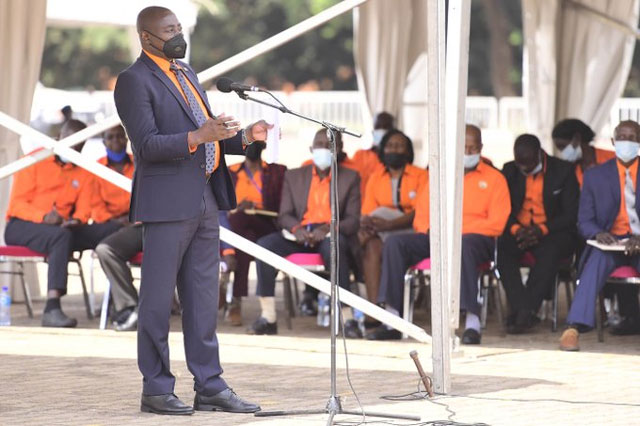
Kampala, Uganda | THE INDEPENDENT | The Ministry of Education and Sports has been accused of failing to supervise private schools.
This fresh wave of public outrage has been sparked by an incident at Kisaasi College school, where students were suspended for what was described as intentional disobedience for dodging a party organized by the school.
“We have therefore resolved that; suspend for one week…he/she must report back with a biological parent. must pay a fine of Shs 100,000 on your school pay code for the losses caused. Must report back after clearing all term ii school fees if any,” the letter issued by the school on July 6th, 2024 reads in part.
Many people who have seen the suspension letter have described the school’s actions as “total madness”. Ali Musoke, a resident of Kisaasi, expressed his shock at seeing the letter circulating on social media.
“At first, I thought it was a fake letter. But my neighbors here have confirmed that it actually happened. How can a school force a student to attend a party, especially one with Muslim directors?” Musoke said.
Musoke believes that attendance at such events should be optional. He also blamed the Ministry of Education for failing to regulate private schools, allowing them to act without proper oversight.
Hasadu Kirabira, the chairperson of the National Private Educational Institutions Association (NPEIA), criticized the school’s decision to make the party mandatory, noting that it was wrong, but he found the imposition of a damage fee even worse.
“In the same letter, it appears that some parents haven’t completed paying school fees. Forcing a parent who is struggling with school fees to pay for a party as if it is a do-or-die situation is unacceptable,” Kirabira said.
He added that the Association is working to engage the school to retract the statement and set aside the suspensions.
Filbert Baguma, an educationist and Secretary-General of the Uganda National Teachers’ Union (UNATU), highlighted practices like the one in question are increasingly serving as a financial benefit for schools, even though they are not part of the curriculum. He raised questions about why parents should be required to pay for events that their children did not attend.
Baguma stressed the urgent need for the Ministry to step in and safeguard parents from these exploitative practices by private schools, which he argues are compromising children’s access to their right to education.
As a former headteacher, Baguma emphasized that while not everything needs strict regulation, the Ministry must expand its oversight role to protect parents and children from unprofessional conduct exhibited by school proprietors and administrators.
Our reporter visited the school to understand what happened from their perspective but was denied access. Attempts to contact the school using the official numbers provided in the letter to parents were partially unsuccessful. One number was out of service, while another was answered by a lady, who identified herself as Dr. Namala Hanifa Ssengendo, who said that the school would soon release an official statement regarding the issue.
She later told URN that the letter in question had been written to protect the image of the school but the suspended students skipped the party at their school in favor of another outside the school.
“The intention was to alert parents whose children didn’t attend the party at school and attended elsewhere for which there was misconduct. So we wanted to alert parents that if your child didn’t attend the party at school and attended the party (outside) the school where there was misbehavior,” she said.
From several interviews, it appears that such practices are common in schools, where parents and students are often pressured to pay for or participate in non-essential activities organized by the school, often at exorbitant fees.
These activities can range from mandatory parties, and tours to purchasing non-essential materials among others. All these place an additional financial burden on families already struggling to cover basic educational expenses. In turn, it has led to growing frustration among parents, who feel victimized by schools prioritizing profit over the welfare and education of their children.
Since education is viewed as a right and public good, there has been increasing pressure in recent years for the Ministry of Education to regulate and enforce regulations on private schools, which are perceived to operate without sufficient oversight. This outcry has primarily focused on concerns regarding school fees and associated charges among other practices.
Speaking to URN, Dr. Denis Mugimba, the spokesperson for the Ministry of Education, explained that the ministry does not micro-regulate schools on day-to-day matters, but irregularities that are identified are addressed promptly upon notification.
Regarding the incident at Kisaasi College, he expressed shock at the school mandating learners to attend such non-core school activities. He emphasized the need for common sense in such situations, suggesting that effective governance through an empowered school board could help manage such issues more effectively.
While Mugimba argues that some issues can be managed by school boards, many private schools have these boards as mere shadows, with little or no actual authority as proprietors and headteachers typically hold final decision-making powers.
As the matter has gone for years unattended, the issue has become a focal point in the ongoing Amanya Mushega Led Education Policy Review Commission, where concerns abound that private education cannot be left on autopilot.
During several public hearings of the commission, there has been here is a growing sentiment that even when the ministry issues directives, enforcement is lax, allowing norms to persist unchanged. with different individuals and persons calling for stringent legislation across both private and public schools to ensure compliance with circulars, regulations, and professional standards.
Meanwhile, regarding fees for school activities, Mugimba indicated that the ministry is currently finalizing regulations aimed at among other issues ensuring accountability. He mentioned that one of the proposed regulations stipulates that any fee imposed on parents must have prior agreement from the parents themselves.
****
URN
 The Independent Uganda: You get the Truth we Pay the Price
The Independent Uganda: You get the Truth we Pay the Price

